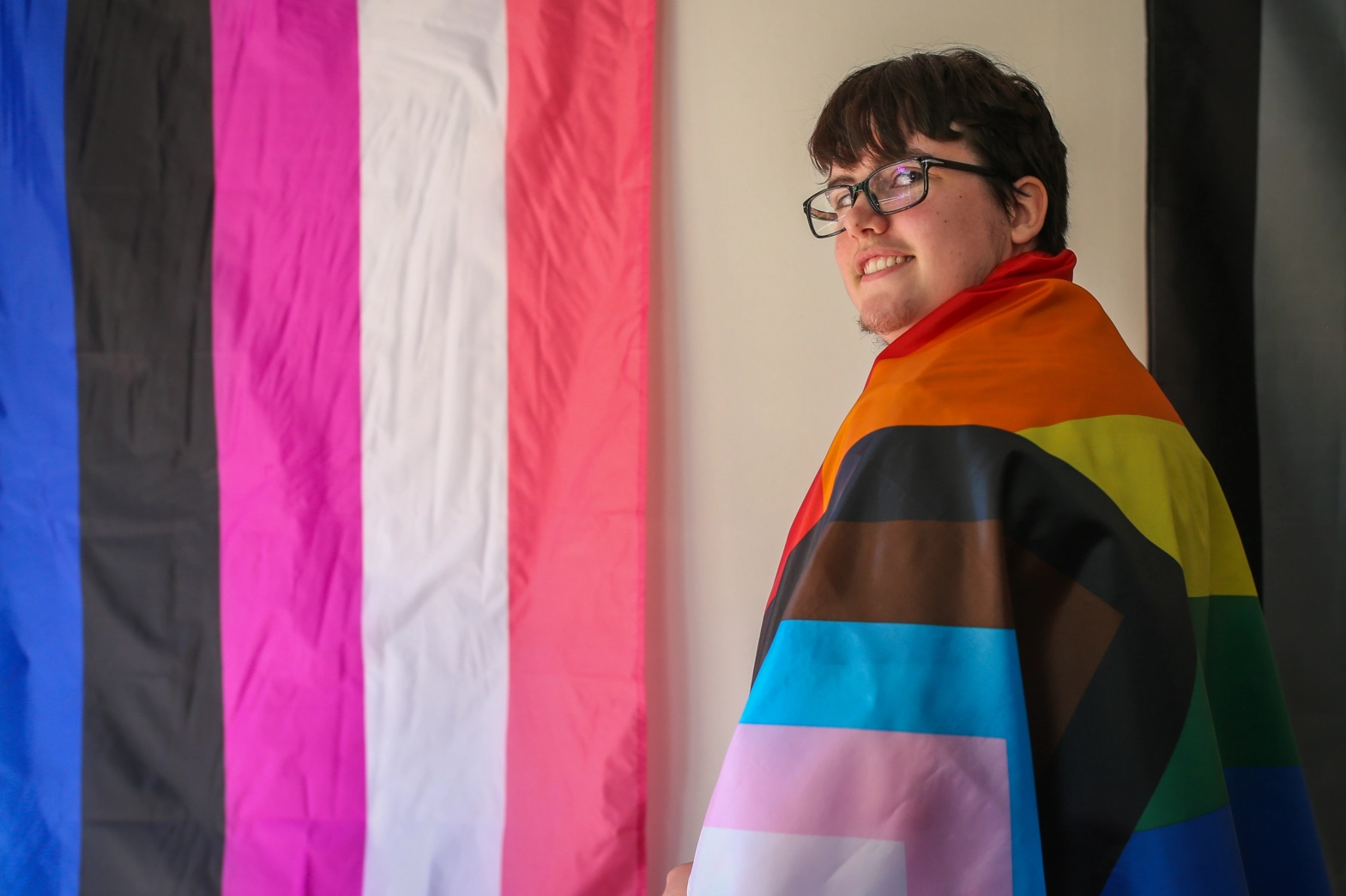During the COVID-19 pandemic, the Rainbow Community Center of Contra Costa County — a nonprofit organization that builds community and supports well-being among Lesbian, Gay, Bisexual, Transgender, Queer, Questioning and Intersex (LGBTQI+) people — saw a drastic increase in desperate young people in crisis who reached out needing services.
One of those young adults, who felt unsafe sequestered at home, is in the process of legally changing his name to Jay Starling.
Many of the youth who request services from Rainbow are unhoused young adults of color. In contrast, Starling, who is White, comes from a privileged family in Pleasanton.
The 21-year-old has three older brothers. Starling says his parents really wanted a daughter, so the whole family was thrilled when their fourth child was a girl. But since age 7, Starling says his birth gender never felt right.
“I thought I would turn into a boy when I went through puberty,” Starling said. “I was so confused when that didn’t happen.”
To exacerbate his confusion, after being home schooled until high school, his parents sent him to a private Christian high school that preached “people who are gay, bisexual or trans are going to hell.”
“They wanted me to be thin and pretty, to wear dresses and makeup and marry a man. But that wasn’t me,” he said.
He came out as bisexual a few years ago, but that didn’t seem right either. After much soul-searching, Starling made the difficult decision to transition from young female to male. His family didn’t understand and couldn’t accept his changing gender identity. “My parents flipped out. I felt like I was in spiritual danger,” he said.
Starling says his family bombarded him with horrible anti-trans comments, such as, “How can you do this to us? You’ll look ugly as a man.”
Pre-COVID he could escape to a coffee shop, his community college or other safe place when things at home got bad. But then everything closed.
“Several months at home with my family was a huge wake-up call,” Starling said. “I got out just in the nick of time.”
In October 2020 his therapist connected him with Rasheeda Blake, youth housing program director for the Rainbow Community Center, who was impressed by the “bright, articulate, thoughtful and humble young person” he was.
Blake quickly facilitated Starling’s temporary move into a hotel while paperwork was completed to place him in transitional housing at Mary McGovern house in Concord. This past June 20, 2021, he graduated to an independent living situation in Crockett. And, next September he hopes to transfer to the University of California at Davis to continue his studies as an English major.
“I needed to be in a supportive place where people understood and validated me.” Starling said. “I didn’t get that at home. I felt unsafe and had to leave. Through Rainbow, I was able to create my own little community of people who love me and who I can love.”

In addition to being the only organization providing transitional secure lodging to houseless youth in northern California, the Rainbow Community Center provides a range of services tailored to the needs of the LGBTQI+ community and its allies. Among Rainbow’s many programs and services are those for clinical and community mental health services, HIV education and prevention programs, professional development, training and mentoring as well as programs geared to older adults, their families and caregivers. Rainbow operates a food pantry that morphed into a food delivery service during the pandemic. They also host a variety of support groups that are currently meeting virtually.
The organization received funding this year from Share the Spirit, an annual holiday campaign that serves residents in need in the East Bay. Donations will help support 56 nonprofit agencies in Contra Costa and Alameda counties. The nonprofit plans to use its grant to make the holidays brighter by providing hot food to the most vulnerable clients during the Thanksgiving and Christmas holidays and providing food/gift cards to their clients.
Starling is soft spoken and thoughtful, self-assured, positive and comfortable answering questions. He describes himself as someone who gets satisfaction by helping make other people’s lives easier. And, in turn, they reciprocate. For example, he recently drove someone who needed a ride to the Department of Motor Vehicles. They then turned around and bought food for someone who didn’t have any money. The person without money turned out to be a wonderful cook who fed everyone.
“That’s how you build a sense of community,” he says.
Starling started hormone therapy this fall to begin his transition. In November he’s having chest surgery, also called Top surgery, to remove his breasts. Blake is giving him a ride to and from his surgery. Blake and other people he’s met through Rainbow are giving him emotional support.
“Everyone (at Rainbow) sees me for who I am, not who they want me to be. That means a lot.” he said.
He says that he’s still in contact with his mother, but doesn’t know whether he’ll go home for the holidays.
“LGBTQ people have always existed. We aren’t going anywhere. I dream of the day when people can come out anywhere, and we won’t be rejected for who we are,” Starling said. “Being allowed to be yourself is important to survival and worth whatever price you have to pay.”
Share this:
- Click to email a link to a friend (Opens in new window) Email
- Click to share on Facebook (Opens in new window) Facebook
- Click to share on X (Opens in new window) X
- Click to share on Bluesky (Opens in new window) Bluesky
- Click to share on LinkedIn (Opens in new window) LinkedIn
- Click to share on Nextdoor (Opens in new window) Nextdoor
- Click to share on Reddit (Opens in new window) Reddit
- Click to share on Mastodon (Opens in new window) Mastodon
